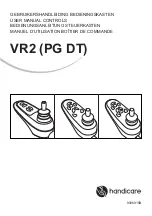
76
In the component 4 column, 1600 and 32000 indicate a flow rate of 50 grams per second. DATA line 3
dispense weight of 0.0 for component 4 and the component 4 is set to 00.0 percent confirming that
component 4 is not dispensing material.
The following information will help you determine what devices are in place on a blender.
Material Dispense Device:
Approx. Grams per Second:
½” Auger Feeders, Micro Pulse Valves
0.5 - 02
1” Auger Feeders
06 - 10
Vertical Valves
20 - 40
WSB 100 - Slide Gates
250 - 450
WSB 220, 420 - 3” Round Slide Gates
500 - 900
WSB 240, 260, 440, 460, 940, 960, 1840, 1860 - 2” x 3” Slide Gates
500 - 900
WSB 240, 260, 440, 460, 940, 960, 1840, 1860 - 3” x 6” Slide Gates
3000 - 5000
Regrinds are always lower then naturals. Bulk density will also cause wide variations in flow rates.
ERROR CORRECTIONS: RATE NUMBERS:
(DATA line 2)
The RATE numbers are used by the software, each cycle, to calculate material dispense times. They are
adjusted every cycle until flow rates stabilize. When a significant error is detected, the software adjusts the
RATE numbers.
The GRAM number is adjusted first. The TIME number (milliseconds) is changed only if the GRAM number
goes below 16,000 or above 32,000 (approximately). In this event both GRAM and TIME numbers are
doubled or halved to bring the GRAM number back to between 16,000 and 32,000.
This serves to keep all numbers as large as possible allowing for the most accurate math, but not so large
as to overflow the registers.
Only the GRAM number changes from cycle to cycle, except under the conditions noted above.
Check the GRAM number for a series of consecutive cycles. If it remains unchanged, then the dispenses
are accurate enough to not trigger error corrections.
The PRC parameter limits adjustments to 10 percent. Do not expect any single GRAM number change
larger than 10 percent.
A gradual decrease in the GRAM number indicates a slowing rate, a hopper that is becoming empty for
example. A jump in rate (increased GRAM number) occurs when the hopper is refilled.
If errors are occurring, but the GRAM number is NOT adjusting, check the NC parameter and the MI
parameter. These parameters control whether or not error corrections occur. Both are set and adjusted
automatically by the software. MI is set after each start up, after 10 cycles have run without retries. MI will
be set to indicate 50 percent of normal dispense rate expressed as grams per second.
NC adjusts slowly over extended periods of running. NC indicates, in grams, the upper limit of the error in
60 percent of the dispenses. A high number usually indicates poor flowing material. Vibration or drifting
load cells are other possibilities.
Summary of Contents for FLEXBUS Lite
Page 6: ...6...
Page 10: ...10 Blender Parts Key...
Page 13: ...13...
Page 100: ...100 Technical Drawings...
Page 101: ...101...
Page 102: ...102...
Page 103: ...103...
Page 104: ...104...
Page 105: ...105...
Page 106: ...106...
Page 107: ...107...
Page 108: ...108...
Page 109: ...109...
Page 110: ...110...
Page 111: ...111...
Page 112: ...112 FCA INSTALLATIONDIAGRAM...
Page 113: ...113 WSB 4088 IO wiring diagram 120V...
Page 114: ...114 D WSB E0001 Electrical Diagram WSB Export Single Phase...
Page 115: ...115 D WSB E0002 Electrical Diagram WSB Export 3 Phase...
Page 116: ...116 D WSB E0003 Electrical Diagram WSB Export 1800 3 Phase...
Page 117: ...117 D WSB E0004 Electrical Diagram WSB Export Maxibatch...
Page 118: ...118 D WSB P0001 Pneumatic Diagram WSB with Non Removable Hoppers...
Page 119: ...119 D WSB P0002 Pneumatic Diagram WSB with Removable Hoppers...
Page 120: ...120...
Page 138: ...138 Flexbus Lite Wiring Diagrams...
Page 139: ...139...
Page 140: ...140 Flexbus Lite Component Map...
















































